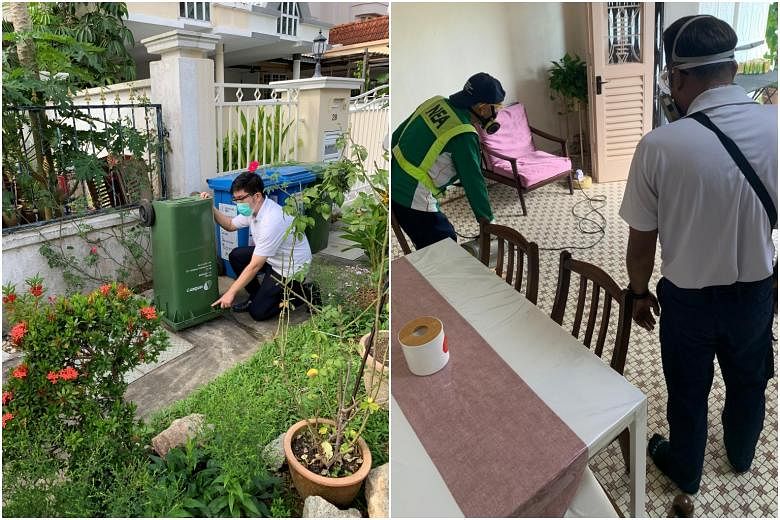SINGAPORE - There will be heavier penalties for households that repeatedly breed mosquitoes, or have multiple mosquito breeding areas, the National Environment Agency (NEA) said, as dengue cases reported this year soared to 12,542 as of Monday (June 22).
The number of weekly dengue cases also exceeded 1,000 in the week ending June 13.
This is the highest number for the same period of the year since 2013, the largest outbreak year recorded in Singapore's history, the NEA noted on Monday.
There has been a significant increase in mosquito breeding found in homes, it said, adding that the incidence of mosquito breeding detected in homes had increased by 50 per cent in the last three years compared with the preceding three.
Currently, households are fined $200 for mosquito breeding detected in their homes, regardless of the number of breeding habitats found.
Offenders are sent to court for the fourth offence.
But from July 15, the fine will be increased to $300 for households who have mosquitoes breeding in more than one place, or where mosquito breeding is detected even after they have been served legal notice that they are in a dengue cluster.
Repeat offenders will also be given heftier penalties or sent to court.
The NEA said the incidence of mosquito larvae detected in homes and common corridors also increased by five times during the recent circuit breaker from April 7 to June 1.
"This is despite more people staying home and being in a position to upkeep their premises better, and comes after years of educational outreach on the prevention of mosquito breeding habitats at home," it said in its statement.
The composition sums will also be raised for mosquito breeding at construction sites.
First-time offenders will have to pay $3,000, up from the current fine of $2,000. Those on their third and subsequent offences will be prosecuted in court.
The NEA said construction sites have improved in stamping out mosquito breeding but it was still occurring in some places.
It will also tighten enforcement on town councils, by increasing penalties for mosquito breeding in common areas such as drains, and scupper or gully traps, from July 15.
Currently, town councils are fined a maximum of $5,000 if mosquitoes are found breeding in common areas inside dengue clusters.
Minister for the Environment and Water Resources Masagos Zulkifli said: "The majority of mosquito breeding is found in residential homes. Immediate action by everyone is required. Even as NEA continues to conduct home inspections and educate residents on what they can do to protect themselves and to prevent mosquito breeding at home, the number of dengue cases has continued to rise."
He said the continued breeding put about 325,000 households living in over 200 dengue clusters islandwide at higher risk of dengue transmission, and higher penalties were needed as deterrent.
As of last Friday, 254 active dengue clusters have been reported, with the five largest located at Woodleigh Close, Leicester Road, Aljunied Road, Tampines Avenue 7, and Chu Lin Road.
Between January and May this year, the NEA conducted more than 351,000 inspections islandwide, including 3,100 checks at construction sites, and uncovered about 8,600 mosquito breeding habitats.
During the same period, more than 1,200 enforcement actions were taken against owners of premises for mosquito breeding.


